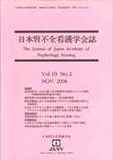- 有料閲覧
- 文献概要
- 参考文献
- サイト内被引用
本研究は,血液透析をしながら働く非糖尿病性腎症の壮年期男性が周囲の人々との関係をどのようにとらえ,どのような取り組みをしているのかを明らかにすることを目的とした.11名の血液透析をしながら働く非糖尿病性腎症の壮年期男性患者を対象とし,半構成的面接でデータ収集を行った.分析は,StraussとCorbinらによるグラウンデット・セオリー・アプローチを用いて質的帰納的に行った.その結果,血液透析をしながら働く非糖尿病性腎症の壮年期男性の周囲の人々との関係は,【透析をしている自分と周囲の人たちとの関係を自分が調整する】をコアカテゴリーとする仕組みとして説明された.患者は,【世の中の人は透析を知らない】と社会の透析に対する考えを見据えながら,【周囲の人たちが透析前と変わらない】,【透析をしながら普通の人と同じように楽しい時間を過ごせる】,【透析をしながら普通の人と同じように働ける】ために,【透析をしている自分と周囲の人たちとの関係を自分が調整する】という取り組みをしていた.この取り組みは,【透析しながらの生活は特別ではない】と感じることにつながっていた.また,【透析をしながら普通の人と同じように働ける】は,【透析をしながら働くことが難しい】と感じながらも,【過去の経験が現在の働くことへつながる】,【透析は羽休めである】というとらえに関連していた.【透析は羽休めである】は,【体調を支えてくれる医師の存在がある】ことによって成り立っていた.以上のことより,血液透析をしながら働く非糖尿病性腎症の壮年期男性が就労を継続していくためには,これらの仕組みを成り立たせること,および仕組みのバランスを保っていくことが看護ケアの活用の可能性として示唆された.
The aim of this study was to clarify how mature-aged males with non-diabetic renal disease working while receiving hemodialysis perceived the relationship with people around them and how they approached the relationship. Using a semiconstitutive interview method, we collected data of 11 mature-aged males with non-diabetic renal disease working while undergoing hemodialysis. The analysis was conducted qualitatively and recursively with a grounded theory approach by Strauss and Corbin, et al. As a result, the relationship between the mature-aged males with non-diabetic renal disease working while receiving hemodialysis and the people around them was explained as a structure for a core category of“he adjusts the relationship between himself receiving hemodialysis and the people around himself”. Looking at the attitude of society toward dialysis― “The public does not know hemodialysis”, the patients were addressing as follows: “They adjust the relationship between themselves undergoing hemodialysis and the persons around themselves”because“the persons around them remain unchanged before hemodialysis”, “they can have a good time like ordinary people while receiving hemodialysis”, and“they can work like ordinary people while receiving hemodialysis”. Introducing the above mentioned approach, they have felt that“their daily life in receiving hemodialysis is not particular”in their own mind. In addition, although“they felt that working while receiving hemodialysis was difficult”, “they can work like ordinary people while receiving hemodialysis”was related to the aspects that“the past experiences led to working”and“hemodialysis was time and space to rest wings or the mind and body”. “Hemodialysis was time and space to rest wings”was based on“the presence of physicians caring patient's physical conditions”. From the above results, in order for mature-aged males with non-diabetic renal disease working while receiving hemodialysis to continue working, it was indicated that ensuring these structures and maintaining the balance of the structures might lead to the utilization of nursing care.
Copyright © 2008, JAPAN ACADEMY OF NEPHROLOGY NURSING. All rights reserved.


